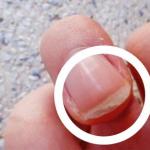Booklet education without punishment. Novosibirsk and Novosibirsk region: latest news, objective analysis, current comments
Having children is, of course, happiness, but, unfortunately, not cloudless. An obedient, impeccable child is more like a robot. A real, living little man will more than once upset his parents with his actions, and punishment will certainly follow. But what should it be like, what can and cannot be punished for?
Seven rules for everyone
Punishment should not harm health - neither physical nor
mental. Moreover, PUNISHMENT SHOULD BE USEFUL. However, the punisher FORGETS TO THINK...
If in doubt whether to punish or not to punish, DO NOT punish. Even if they have already realized that they are usually too soft, trusting and not decisive. No “prevention”, no punishment “just in case”!
One thing at a time. Even if an immense number of offenses are committed at once, the punishment can be severe, but only one, for all at once, and not one by one for each. Punishment salad is not a dish for a child's soul!
PUNISHMENT IS NOT AT THE EXPENSE OF LOVE. NO MATTER WHAT HAPPENS, DO NOT DEPRIVE YOUR CHILD THE PRAISE AND REWARDS YOU DESERVE.
NEVER take away what you or anyone else has given you - NEVER!
Only punishments can be cancelled. Even if he misbehaved in such a way that it couldn’t be worse, even if he just raised his hand against you, but today he helped the sick, defended the weak...
DO NOT MISTAKE YOUR CHILD TO BE DIFFERENT.
Statute of limitations. It is better not to punish than to punish belatedly. Some overly consistent educators scold and punish children for offenses discovered a month or even a year later (they ruined something, stole something), forgetting that even harsh adult laws take into account the statute of limitations for the offense.
It is necessary to leave and forgive.
Belated punishments INTRODUCES the past to the child and prevents him from becoming different.
Punished - forgiven. The incident is over. The page is turned. As if nothing had happened. Not a word about old sins. Don't stop me from starting your life over!
No humiliation. Whatever it is, whatever the guilt, punishment should not be perceived by the child as a triumph of our strength over his weakness, as humiliation. If a child believes that we are unfair, punishment will only work in the opposite direction!
A child should not be afraid of punishment. He should not be afraid of punishment, but of our chagrin. Although a child, not being perfect, cannot help but upset those who love him. Nor can he live in constant fear of causing grief. He protects himself from this fear.
When not to scold
YOU CANNOT PUNISH OR SCORE:
when a child is sick, experiences some kind of ailment, or has not yet fully recovered from an illness, the psyche is especially vulnerable, reactions are unpredictable;
when he eats; After sleep; before bedtime; during the game; during work;
immediately after a physical or mental injury (a fall, a fight, an accident, a bad grade, any failure, even if only he himself is to blame for this failure) - you need to at least wait until the acute pain subsides (this does not mean that you need to certainly rush to console);
when you can’t cope: with fear, with inattention, with laziness, with mobility, with irritability, with any shortcoming, making sincere efforts; when he shows inability, stupidity, awkwardness, stupidity, inexperience - in all cases when something DOES NOT WORK out;
when the internal motives of an action, the most trifling or the most terrible, are incomprehensible to us;
when we ourselves are not ourselves; when you are tired, upset or irritated for some reason.
Remember suggestibility
Here is one of the most common, most ridiculous mistakes. By scolding a child, that is, more than decisively and convincingly asserting that he (she) is: a lazy person, a coward, a stupid person, an idiot, a scoundrel, a monster, a scoundrel, then we inspire all this - the child BELIEVES.
Words for a child mean only what they mean. Every statement is perceived unambiguously: no figurative meaning. Adult game“Understand it the other way around” is not immediately absorbed, and the subconscious never assimilates it. By assessing, we instill self-esteem.
nothing will ever come of you! you're incorrigible! abnormal!
the real traitor!
you have only one road (to prison, under the fence, to the panel, to the hospital, to hell), then don’t be surprised if this turns out to be the case. This is a real DIRECT Suggestion, and it works.
Therefore, when punishing your children, first of all, think: WHY?
About a new approach to problem solving social orphanhood and child abuse, the chairman of the board of the foundation, Marina GORDEEVA, told reporters.
- Actually high level It is recognized that the topic of orphanhood and cruelty to children requires today special attention, - began Marina Vladimirovna. — Society asks questions: how to change the situation? Why is the number of orphans, if declining, not as significant as we would like? There are more of them today than in 2000. This means that there are some basic problems that do not allow us to solve this problem. Funds are being allocated. But a fundamental change does not occur! More than 120 thousand such children are identified every year. Number of deprivations parental rights is growing - in 2009 in Russia, 72 thousand children had their parents deprived of parental rights! Many children end up in orphanages immediately after birth. Increased funding to solve problems of families and children in traditional forms (benefits, summer rest, maternal capital and others), did not give the desired effect in reducing the number of orphans. Today there is an understanding of what we need. Firstly, preserving the blood family for the child and preventing parents from abandoning their children. Secondly, the introduction into practice of new social technologies aimed at preventing family problems. It sounds a little dry, but we understand: effective technologies are needed not only in the economy and production, but also in the social sphere. Our approaches have been focused on ill-being, it is time to shift the focus to prevention. It's easy to say. But if we look at how everything happens in life, we will see that everything is tailored to a neglected case. And specialists must understand that they will in no way replace parents for a child. They are only to help the family, to support. The third priority is the placement of children left without parental care in foster families and their professional support.
 In search of these new ways in social work, the president decided to create a fund to support children in difficult situations. life situation. August 25 marked two years since we registered our charter and started working. The mission of the foundation is to create a new management mechanism that, with the division of powers between the federal center and the constituent entities, will significantly reduce the social disadvantage of children and families with children and stimulate the development of effective forms of work. Unlike other charitable foundations, we do not work with requests from citizens or organizations; we co-finance regional programs that are aimed at achieving systemic changes in the situation of families and children, as well as projects of municipalities and non-profit organizations. It is important for the foundation that programs and projects are comprehensive and can be replicated. Equity financing. Regional programs receive at least 70 percent of their budget from the funds of the constituent entities Russian Federation and raised funds from partners from commercial and non-profit organizations. The foundation allocates 30 percent. For highly subsidized regions, 50/50 funding is provided.
In search of these new ways in social work, the president decided to create a fund to support children in difficult situations. life situation. August 25 marked two years since we registered our charter and started working. The mission of the foundation is to create a new management mechanism that, with the division of powers between the federal center and the constituent entities, will significantly reduce the social disadvantage of children and families with children and stimulate the development of effective forms of work. Unlike other charitable foundations, we do not work with requests from citizens or organizations; we co-finance regional programs that are aimed at achieving systemic changes in the situation of families and children, as well as projects of municipalities and non-profit organizations. It is important for the foundation that programs and projects are comprehensive and can be replicated. Equity financing. Regional programs receive at least 70 percent of their budget from the funds of the constituent entities Russian Federation and raised funds from partners from commercial and non-profit organizations. The foundation allocates 30 percent. For highly subsidized regions, 50/50 funding is provided.
Marina Gordeeva recalled the areas in which work is being done with the fund’s partners in the regions. This is the prevention of family dysfunction and social orphanhood of children, the restoration of a family environment favorable for raising a child, the family placement of orphans and children left without parental care. This social support families with disabled children to ensure maximum possible development such children. This social rehabilitation children who have committed offenses and crimes, prevention of neglect and juvenile delinquency. The Foundation is trying to reorient the activities of the regions and move from eliminating consequences to preventing difficult life situations among Russian children. The experience of the regions, in particular the Tomsk region, shows that this approach can significantly reduce the number of children left without parental care. Among the new technologies that are being introduced in the regions, Marina Vladimirovna named the following: case management, home assistants and individual tutors, support for families and selection by specialists of correction methods at all stages of trouble, social district service, psychological assistance service in registry offices in order to prevent divorces and other.
“One of the most successful practices in the area of preventing social orphanhood is being implemented in the Tomsk region,” said Gordeeva. — The Siberian Federal District has the highest proportion of orphans in the total number of children in Russia—4.13 percent. In the Tomsk region this figure is now at 2.98 percent. Before the start of the implementation of the “Children’s Right to a Family” program in 2008, it was 3.42 percent. This is already a noticeable trend. Progress is taking place because the Department of Family and Children Affairs has built a very effective work. In 2009, a new specialization for social workers appeared here - “case manager”. The main task of the curator is to prevent family troubles and provide timely assistance to the family. By involving the family in the rehabilitation process, the curator, together with the family, finds a way out of a difficult life situation. By the beginning of 2010, 920 families were in their area of attention. Of these, 443 are at an early stage of a family crisis. (We became acquainted with how case curators work and even with some families who have such curators at the Tomsk social rehabilitation center “Luch”. In total, there are 115 case curators in the region, employing 150 people.)

Separately, Marina Gordeeva focused on the problem of child abuse.
Today, she admitted, no department has the complete picture. As Moscow experts later complained, each one keeps its own statistics, the numbers vary, are duplicated in some places, and it is almost impossible to compare the data with each other. However, the fact that the number of crimes against children and adolescents goes beyond all conceivable limits is beyond doubt.
By the way, the most common (35,381 people in 2008) crime against children - malicious evasion of child support - is not formally related to child abuse. But in essence that is exactly what it is. According to Gordeeva, the scale of the disaster is underestimated, because the figures that are being made public are terrifying, but they are only the tip of the iceberg. While extreme forms of violence involving deaths are the subject of outrage, domestic violence is widespread. A study commissioned by the Institute of Sociology of the Russian Academy of Sciences noted: corporal punishment is perceived by a significant part of the population as the norm, 52 percent of parents use physical punishment.
To change the situation, the foundation, together with the Ministry of Health and Social Development and the constituent entities of the Russian Federation, was tasked with conducting a nationwide information campaign against child abuse in 2010.
“Her primary task,” Marina Gordeeva recalled, “is to promote the formation of an intolerant attitude towards violence in society.” Early identification of cases of abuse is necessary. You can't take things to extremes. Do not find "Mowgli" who were raised in a doghouse. This, of course, is a few, but this is nonsense! And if a problem occurs, then people should be aware of the possibilities of resolving the problem with the help of appropriate services. It can be different shapes- from helplines to children's rights ombudsmen. It is important to overcome the indifference of adults - neighbors, teachers, specialists working with children, so that they also perceive messages about trouble. It is necessary to understand the situation as early as possible and help the family. It is even more economically profitable to invest in preventive measures than to then take the child from the family to government agencies. As part of the campaign, the foundation is holding a series of events. Started in March charity marathon“Childhood without cruelty and tears”, which we conduct jointly with the Association of the Children's Products Industry. The first event made it possible to provide toys for children from the Vityaz social rehabilitation center in the Kaluga region. In May, children's goods were received by institutions in St. Petersburg, and on June 1 - in the Ulyanovsk region. At the end of the year, children's goods will be delivered to 37 social institutions from 18 regions.
On May 25, the Public Chamber hosted a presentation of the movement “Russia - without cruelty to children” and the Internet portal for parents “I am a parent” (www.ya-roditel.ru). President Dmitry Medvedev was the first to join the movement. Every interested citizen, organization, corporation, municipality and even an entire region can follow his example and report it on the “I am a Parent” portal. Joining the movement is supported by specific actions. In June, television began showing the video “The First Spank” - about how the spank that an obstetrician gives so that the child begins to breathe should be the first and the last.
In July we held the campaign “Belt is not a method of education.” Famous athletes, TV presenters, and pop stars donated their belts as a sign of support for the movement “Russia - no cruelty to children!” A special chest contains the belts of Daniil Spivakovsky, Yegor Konchalovsky, Igor Vernik, Yuri Nikolaev, Oleg Gazmanov, Alexander Oleshko, Svetlana Masterkova and others. From these belts, the designer will create an unusual art object, which will be given to the winner of the city competition.
The All-Russian Children's Forum “Children Against Cruelty and Violence” was held at the Orlyonok camp, the result of which was an open appeal from children to all adults about the inadmissibility of the use of cruelty. 2,443 children signed the appeal.
Elena KVASNIKOVA,
Tomsk—Novosibirsk.
According to 8% of Russians, a belt is a necessary way of raising children, and 58% of our compatriots consider physical force for educational purposes to be justified only in exceptional cases. It is interesting that this opinion is unanimously shared by both residents of the Russian Federation who have and those who do not have children. But among men there are much more categorical supporters of assault: 11% of men and only 5% of women said that a belt is a “necessary method of education.”
About a third (34%) of Russians consider physical punishment of children unacceptable in principle.
Total sample size: 1800 respondents.
Customer: radio station "Police Wave".
Study population: economically active population of Russia aged 18 years and older.
Question: Do you think methods of physical coercion (slap, slap, belt) are acceptable as a way of raising children?
The respondents' answers were distributed as follows:
Respondents' comments:
Yes, this is a necessary method of education.
“That’s how my parents raised me. It turned out quite well."
“I don’t think there are many parents who have never punished their children. I'm not saying you need to beat yourself to death, but in some cases you need to be tough. If, contrary to suggestions, he puts a carnation into a socket or climbs under the wheels of a moving car, he will get it in the butt.”
“The child must understand that there will be punishment for an offense, and not just talk - physical punishment should be more offensive than painful.”
Only in exceptional cases
“My child is a real little devil, and this is not even because of indulgences in upbringing, just genes. Sometimes a good spank - the only way impact."
“Our children have become so painfully susceptible, so first of all we need to act with persuasion and persuasion, but it is in exceptional cases that “one blow replaces 100 hours of political work.”
“Theoretically, I am against physical punishment, but in practice... sometimes my nerves can’t stand it. I can say, as a mother of two children, that each child is born with his own character and he himself suggests which methods are best suited for his upbringing. From birth, the eldest son responds to screaming, spanking, punishment with even greater whims, protests, insults, even more bad behavior. Since he began to understand human speech well, the most basic method of influencing him was persuasion, explanation, and persuasion. And sometimes you can’t stop the younger one with anything other than a spank...”
“This is not a method! Unfortunately, words don't always work. And if your nerves give way... therefore, “unpopular” measures are used.”
No, I consider corporal punishment unacceptable in principle.
“I’ve been beaten since childhood, a lot: it hurts and it doesn’t hurt, in every way. Especially during the school period. Mom demanded a lot from me. This does not help mutual understanding. It hardens. It's horrible. It doesn't give anything. It didn't make me any better, it didn't make me any worse. When was my birthday younger brother, he got it too - both from his mother and from me. I'm so sorry that I was aggressive and intolerant. I just didn’t have any other model of behavior before my eyes. I responded with the same answer that I managed to receive. Thank God, in my adult life this passed me by..."
“Children are our reflection. If you don’t like the way you look today, you don’t break the mirror, do you?”
“For some reason, when talking with adults, we don’t use the belt as an argument, no matter how stupid they are, but we initially put children in a dependent position, immediately showing that they have no right to have their own opinion? What kind of personality will grow in this case?”
“The most valuable thing in life is personal freedom. Any violence is unacceptable, because... The child is small, but a personality! And everything that is laid in childhood shapes an adult! And... beloved children should be spoiled!”
“A Man was born! From the first day of birth you need to be equal to him. Yes - it is a great job to raise your child as a person worthy of being one. You need to be tolerant of him at any age, convincing him of something only with your good example, tact and word.”
“Corporal punishment is carried out, as a rule, by people with insufficient intelligence - or people with pathological psychoses... which, in principle, is the same thing.”
Blog embed code
Belt as a way of education
Two-thirds (66%) of Russians consider physical force to one degree or another an acceptable way to raise children! The belt is not for spanking. "The guys, together with their parents, prepared for the competition for a long time and responsibly.
The crafts turned out to be so varied and interesting.




Publications on the topic:
“What is kindness?” We, in our group, cultivate in our children love, an affectionate and sensitive attitude towards the closest people - dad, mom.
These are newspapers submitted to the competition by parents and teachers of the 1st junior group. Everyone put in maximum effort and creativity. Our.
Promotion: “Skvorushka”“Let’s, friends, wherever we live, let’s plant trees and create gardens. Let us strive for this, So that both the beast and the bird love us, And trust us.
Campaign “Save the primroses” With the onset of spring, all nature comes to life and blooms. In the last days of April, at the beginning of May the first ones occur.
Good day to all MAAM members! So my senior children and I decided to take part in the International Garland of Friendship campaign. That’s it.
In our group "Knowledge" a lot of work is being done on the rules of the road - games, conversations, educational activities, productive activities. The summation of all.
On the eve of the Great Victory Day, we decided to organize an action “We are for peace!” in our kindergarten. With this action we wanted to say: “Let it go.
- If we want a child to be polite, we need to be polite to the child ourselves.
- It is important for a child to know what disobedience can lead to. Promises of punishment and reward must always be kept and not left as an option.
- It is worth remembering that only through rewards is it possible to build mutual understanding with a child.
- You cannot evaluate a child at the time of punishment. You need to talk exclusively about how you feel and how you feel about the action.
10. Do not hover over the child, position yourself so that you are at the same level with him and look into his eyes. This is the only way you will be sure that he understands what you are saying.
Dear parents, remember that you should punish and praise immediately, and not put it off until later. If you make a mistake, don't be afraid to admit it. The sincerity of an adult will give rise to the sincerity of a child and strengthen your union.
Good luck to you in the difficult task of raising your beloved child!
Municipal educational institution gymnasium No. 1
Psychological service
or reward and punishment
as methods of education
baby
2011
Often parents who use physical punishment on a child say: “He doesn’t respond to anything except the belt. He’s asking for a belt.” And no one can admit that they take it out on a child when they feel bad. They feel powerless and don't know what to do. Hitting is faster and easier than understanding and listening; beating does not require thinking.
Punishment as commonly used is not an educational method, but a humiliating and humiliating procedure that can lead to problems in the future. And that's why:
- Punishment makes children hate themselves and others. They don’t like themselves when they are punished, and they develop low self-esteem.
- When punished, children do not learn to do the right thing, but only look for ways to avoid punishment. They learn to be cowardly and dishonest. Fearing that they will be caught doing something bad.
- Punishment teaches children that there is something wrong with them. If a child lacks love and attention, then by bad behavior they will strive to get at least a little of this attention.
- Fear increases with each blow of the belt, if the children do not understand the reason for the punishment. The repetition of bad actions suggests that children do not know what their mistake was.
Punishment is a very difficult thing and requires caution, so we recommend avoiding punishment if possible. As a last resort, some types of punishment can be allowed: delay of pleasure, delay of pocket money, prohibition of going out with friends.
Encouragement is a positive assessment of a child's behavior. It evokes positive feelings and a desire to continue working. There are a wide variety of forms of encouragement: a smile, an approving look, praise, awards, gifts.
As with punishments, you also need to be careful with rewards. There is never any need to announce any rewards in advance. It is better to limit yourself to praise and approval.
Rules for requiring obedience
The child does not know the rules well, the parents gradually teach him and control his behavior. There are many dangerous things in the world that parents should warn their children about. Putting forward certain demands.
There should not be too many requirements for the child; they must be correlated with the child’s age. In order for a child not to violate the requirements, he must hear and understand them, so you need to be able to correctly place demands on the child.
- Requirements must be unambiguous and understandable.
Incorrect: “Don’t play around.”
Right : “Sit quietly for 5 minutes.”
- The requirement must be appropriate to the age and capabilities of the child.
Wrong: ask the child to sit quietly for 30-40 minutes.
Right: offer an interesting activity.
- It is better to give simple requirements that do not consist of several more. In this case, it is better to separate them into parts and present them separately.
Wrong: “Clean up the room.”
Correct: “Wash the floor.”
- Requirements should not contain the particle “no”. It is necessary to communicate what he should do, and not what he should not do.
Incorrect: “Don’t play around.”
Right: “Do this.”
- You need to make demands calmly, without shouting or setting conditions.






